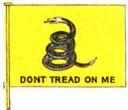The Thirteen American Colonies
Part
3: Beliefs and Revolution
Beliefs
 The
Pilgrims in Massachusetts and the Quakers in Pennsylvania
were examples of people who had left England so they could
practice the religion they chose. Maryland and Rhode Island
passed laws of religious toleration (meaning that people
couldn't be harmed just because their religion was different
from other people's).
The
Pilgrims in Massachusetts and the Quakers in Pennsylvania
were examples of people who had left England so they could
practice the religion they chose. Maryland and Rhode Island
passed laws of religious toleration (meaning that people
couldn't be harmed just because their religion was different
from other people's).
These
American colonists also believed that they had a right to
govern themselves. More and more, they believed that they
shouldn't have to pay so much in taxes to England,
especially since they couldn't serve in the English
government and have a say on how high or low those taxes
were.
Revolution
As
more and more Americans voiced their concerns over higher
and higher taxes, a conflict began to build. The English
response was to isolate the colonies from each other, in
hopes that the American people would not pull together as a
whole. An example of this is the Intolerable
Acts, which
singled out Massachusetts in general and Boston in
particular. One provision of these Acts was to close the
port of Boston entirely. This was serious business. Boston
was one of the largest ports in America. Closing it meant
that Americans couldn't get food and other essentials from
England or anywhere else, unless they paid extra for it to
be transported from other ports, like New York.
 But
the punishment of Boston backfired. The Americans pulled
together as never before. They took up arms against their
English governors and fellow soldiers. Even though they had
fought for England in the French
and Indian War
(George
Washington
included), they now fought against England for the
right to govern themselves. The result was the
Revolutionary
War, which ended
in American victory.
But
the punishment of Boston backfired. The Americans pulled
together as never before. They took up arms against their
English governors and fellow soldiers. Even though they had
fought for England in the French
and Indian War
(George
Washington
included), they now fought against England for the
right to govern themselves. The result was the
Revolutionary
War, which ended
in American victory.
A
new nation was born, one that had its roots in the conflicts
between several European nations. That new nation would have
to make its own way in an angry world.
First
page > Coming
to America
> Page 1,
2,
3
Graphics
courtesy of ArtToday



 The
The
 But
the punishment of Boston backfired. The Americans pulled
together as never before. They took up arms against their
English governors and fellow soldiers. Even though they had
fought for England in the
But
the punishment of Boston backfired. The Americans pulled
together as never before. They took up arms against their
English governors and fellow soldiers. Even though they had
fought for England in the 
